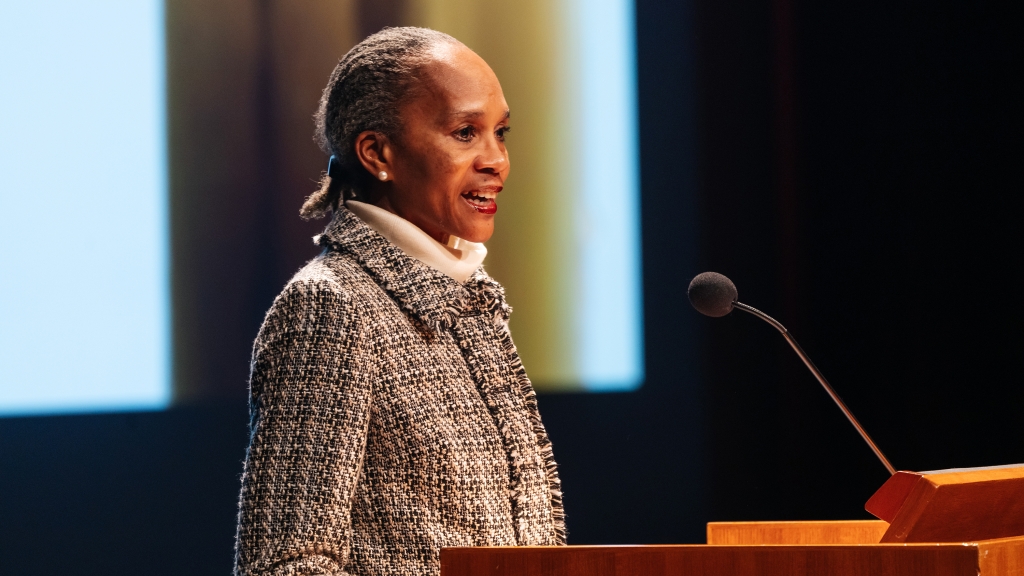For the past 12 years—until COVID-19 shuttered campus for the spring term—staff and administrators arriving at Parkhurst Hall early in the morning may have heard the lyrical tones of a clarinet running up and down scales or shaping the notes of a Mozart concerto.
"I practice every day early in the morning," says Evelynn Ellis, vice president of Institutional Diversity and Equity, who before beginning her career in higher education trained as a classical musician, specializing in late classical and early Romantic chamber music. "I start every day with practice, and the rest of the day I'm in that musician's place of calm. It's the best gift I could give myself."
Ellis retires from Dartmouth July 1, with plans to spend time with family and loved ones ("whenever we can go visit family again"), to garden, and yes, to make music. And though the halls of Parkhurst may be quieter in her absence, she leaves a profound legacy on campus.
"There are few colleagues who have done more to move Dartmouth's culture forward on critical issues of equity and diversity than Evelynn Ellis," says Provost Joseph Helble. "She has also been a driving force behind Dartmouth's annual Martin Luther King Jr. celebration, a powerful event on campus each year, and one that brings our community together around the ideals of social justice."
Ellis came to Dartmouth in 2008 as director of Equal Opportunity and Affirmative Action and was named vice president of IDE in 2011.
Before Dartmouth, she was senior director of the Office of Graduate Educational Equity Programs at Pennsylvania State University, where she had worked in a variety of roles related to equity and outreach since 1985.
Perhaps most visible on campus in her role as co-chair of the annual celebration of Dr. Martin Luther King Jr. each January, Ellis helped oversee the launch and—as a member of the executive committee—the execution of the Inclusive Excellence initiative begun in 2016 as an effort to increase inclusion and diversity at Dartmouth for faculty, staff, and students.
Inclusive Excellence is one of three major initiatives Dartmouth has started in recent years to improve campus climate, along with Moving Dartmouth Forward, an effort to prevent high-risk behavior, and the Campus Climate and Culture Initiative (C3I), which addresses issues of sexual misconduct and other abuses of power in the Dartmouth community.
Of these initiatives, Ellis says, "They have created a conversation, and shifted that conversation in the direction that it should go. What I hope now is that the conversation develops into additional concrete action items, because it's a cultural change that's needed."
She cautions that progress often meets the most resistance when it starts to work. "The term I use often is 'don't blink,'" she says. "Once you start to get momentum, some people will start to push back. But people wouldn't push back if you weren't being successful. So I would ask my institution: Don't blink. When people start to resist good things that you're doing, keep pushing."
"There aren't many leaders who are so in tune with the needs of their people," says Theodosia Cook, who recently left her role as Dartmouth's director of C3I to become chief diversity officer at the University of Colorado.
"What people don't know about Evelynn is she manages from the point of view that her people are more than just employees at Dartmouth—they are whole human beings," Cook says. "She has worked through so many challenges at Dartmouth with that perspective—that we must all recognize that faculty and staff aren't just Dartmouth employees, because creating a more inclusive environment means considering the whole human being. I am so grateful for the sacrifices Evelynn has given to our community and I know the next chapter will be beautiful."
Rabbi Daveen Litwin, dean and chaplain of the Tucker Center for Spiritual and Ethical Life, calls Ellis "a deeply valued colleague whose soft voice and powerful spirit impacted the lives of multitudes of students, faculty, and staff through her unwavering dedication to diversity and inclusion."
"Whether addressing issues of systemic inequity, lifting up stories of social justice, or bringing her own gifts of music through voice and clarinet to the annual Rev. Dr. Martin Luther King Jr. celebrations at Dartmouth, Dr. Ellis has modeled courage, grace, and fortitude."
Ellis was born in Sawyerville, Ala., and says she learned to sing before she learned to speak full sentences. She discovered classical music when, as a child, she happened to hear Mahler's Symphony No. 1 on the Birmingham public radio station.
"It took my breath away. And I knew: I'm going to play music. I was a poor kid in the South, but that music sealed my fate," she says. She studied music as an undergraduate at Alabama Lutheran College and Concordia College in Bronxville, N.Y., and earned a master's in music performance, clarinet, from Penn State.
But she was always drawn to equity issues in higher education—"what my elders would have called 'paying attention to the least of us,'" she says. That led her to complete her DEd in higher education administration at Penn State.
In the current crisis that is the COVID-19 pandemic, structural inequities in higher education and elsewhere are more starkly visible than ever, Ellis says, as some students have ample access to internet, study space, and other resources, while others face precarious circumstances.
Ellis says the pandemic played a role in her decision to retire.
"I've never taken life lightly, and this virus has made it crystal clear that we can't take it for granted. It's been eye-opening for me. Life is short, and it goes so quickly. All of my life, my priority has been my career, and it's time for me to shift."
Hannah Silverstein can be reached at hannah.silverstein@dartmouth.edu.
